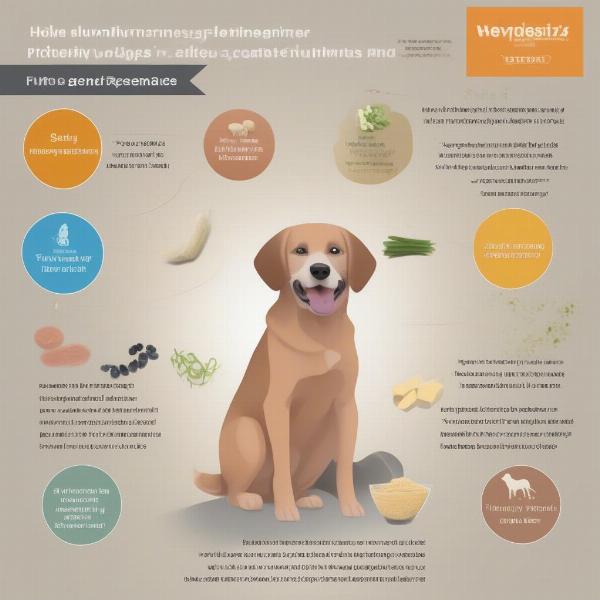Choosing the right kibble for a dog with a sensitive stomach can feel like navigating a minefield. Symptoms like vomiting, diarrhea, and itchy skin can be distressing for both you and your furry friend. Finding the best kibble for dogs with sensitive stomachs involves understanding the ingredients, looking for specific formulations, and sometimes, a bit of trial and error. This article will guide you through the process of selecting the perfect kibble to soothe your dog’s sensitive tummy.
Understanding Food Sensitivities in Dogs
Food sensitivities, unlike food allergies, don’t involve the immune system. They’re typically reactions to specific ingredients that a dog’s digestive system struggles to process. Common culprits include artificial colors, flavors, preservatives, and certain protein sources like beef, chicken, or dairy. Identifying the trigger ingredient is key to finding the right food.
Key Ingredients to Look for in Sensitive Stomach Kibble
When browsing the pet food aisle, focus on kibble formulated specifically for sensitive stomachs. These often feature:
- Hydrolyzed protein: Broken down into smaller pieces, making it easier to digest.
- Single protein source: Helps pinpoint potential triggers if your dog reacts to common proteins. Novel proteins like venison, duck, or kangaroo are often good choices.
- Limited ingredient diets: Contain fewer ingredients, minimizing the chances of a reaction.
- Probiotics and prebiotics: Support gut health and improve digestion.
- Fiber sources like beet pulp or brown rice: Promote healthy bowel movements.
 Ingredients commonly found in kibble for sensitive stomachs: hydrolyzed protein, single protein source, probiotics, prebiotics
Ingredients commonly found in kibble for sensitive stomachs: hydrolyzed protein, single protein source, probiotics, prebiotics
What to Avoid in Kibble for Sensitive Stomachs
Just as important as knowing what to include is understanding what to avoid:
- Artificial colors, flavors, and preservatives: These can irritate the digestive system.
- Common allergens like wheat, corn, and soy: Many dogs are sensitive to these ingredients.
- High-fat content: Can exacerbate digestive upset.
- By-products: These are often low-quality and difficult to digest.
Top Kibble Recommendations for Sensitive Stomachs
While each dog is unique, some kibble brands consistently receive positive reviews for their sensitive stomach formulas:
- Royal Canin Veterinary Diet Gastrointestinal Low Fat: A veterinarian-recommended option.
- Hill’s Science Diet Sensitive Stomach & Skin: A popular choice for addressing both digestive and skin issues.
- Purina Pro Plan Sensitive Skin & Stomach: Offers a variety of formulas for different life stages.
Transitioning to a New Kibble
Even with a sensitive stomach formula, it’s crucial to transition slowly. Mix increasing amounts of the new kibble with the old food over 7-10 days to avoid further digestive upset.
When to Consult a Veterinarian
If your dog’s symptoms persist or worsen despite dietary changes, consult your veterinarian. They can help rule out underlying medical conditions and recommend further diagnostic tests or specialized diets.
Conclusion
Finding the best kibble for dogs with sensitive stomachs requires careful consideration of ingredients and a gradual transition. By focusing on limited ingredient diets, hydrolyzed proteins, and avoiding common allergens, you can help your furry friend enjoy mealtimes without digestive distress. Remember to consult your veterinarian if symptoms persist or worsen.
FAQ
- How do I know if my dog has a sensitive stomach? Common signs include vomiting, diarrhea, gas, bloating, and itchy skin.
- Can I give my dog human food if they have a sensitive stomach? It’s best to stick to a specially formulated dog food to ensure balanced nutrition.
- How long does it take to see improvement after switching kibble? You should see some improvement within a few days to a week.
- What if my dog still has symptoms after trying several sensitive stomach kibbles? Consult your veterinarian to rule out other medical conditions.
- Are grain-free kibbles always good for sensitive stomachs? Not necessarily. Some dogs can also be sensitive to ingredients commonly found in grain-free formulas.
- Can stress cause digestive upset in dogs? Absolutely. Stress can exacerbate sensitive stomach issues.
- Is homemade dog food a good option for sensitive stomachs? It can be, but it’s important to work with a veterinary nutritionist to ensure a balanced diet.
ILM Dog is a leading online resource for dog owners worldwide, offering expert advice on all aspects of dog care and wellbeing. From breed selection and health to training, nutrition, and grooming, we provide comprehensive, practical information to help you navigate the joys and challenges of dog ownership. Whether you’re a seasoned dog parent or just starting out, ILM Dog is your trusted companion on this incredible journey. Contact us at [email protected] or +44 20-3965-8624 for personalized guidance. We are passionate about helping you provide the best possible care for your beloved canine companion. Visit us at ILM Dog.